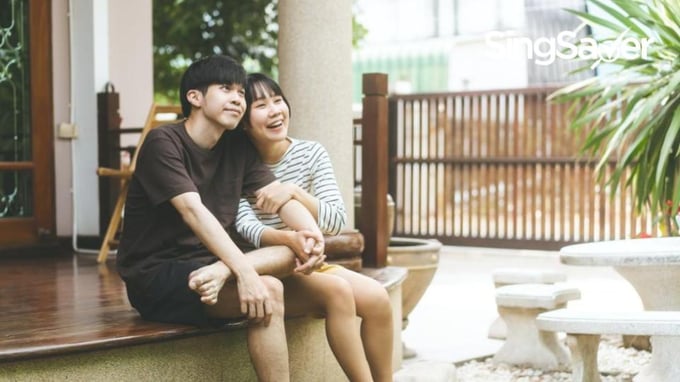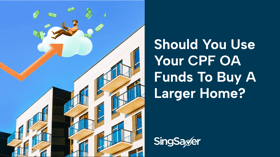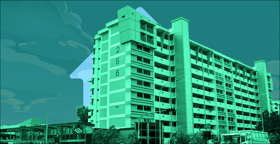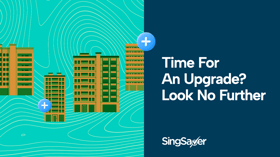From property prices to all the hidden costs, here’s a breakdown of how much you need to own a landed property in Singapore and get one step closer to Crazy Rich Asians status.
I’m sure many of us were left crazy envious after reading the articles done on Sheng Shiong’s co-founder Lim Hock Leng’s not-so-humble abode complete with air wells and courtyards, as well as SecretLab’s co-founder Ian Ang’s Good Class Bungalow (GCB) and penthouse worth S$51 billion that is feature-worthy for Selling Sunset.
Whether you’ve managed to save up enough cash to seriously consider owning a landed property, or are purely just here out of curiosity to see if your bank account is fat enough for a home upgrade, here’s a guide to all the essential costs of owning a landed property in Singapore.
Types of landed property in Singapore
For the uninitiated, landed property may all look the same but there are actually various types:
- Terrace house - part of a row of houses with at least three units, where the middle units have shared walls on both sides with their neighbours
- Semi-detached house - two units built side by side and have a shared wall in the middle, in which the layout and facade are mirror images of one another
- Bungalow/detached house - a standalone, free-standing building that does not share any walls or roofs with other units
- Good Class Bungalow (GCB) - the cream of the crop, GCBs are essentially bungalows with a land area of at least 1,400sqm and is the most luxurious of all landed properties
Why stay in a landed property?
The main draw of landed properties is the huge land space that you have. Living in a landed property is ideal (of course only if you can afford it) if you have three generations living under a roof, so you won’t be bumping into one another all the time and have sufficient space to avoid feeling too suffocated.
With the large land size, it is also perfect for aspiring dog-owners, especially if you plan on buying or adopting bigger breeds like golden retrievers and labradors that are only allowed in condominiums or landed properties. This gives them ample room to run and play, as well as a grass patch (for some houses) in between their daily walks.
Though most landed properties will not give you access to any amenities like the gym or the pool that condominiums offer, you can get your healthy dose of exercising by jogging around the neighbourhood or heading to the nearest public pool (unless you have your own private pool). If you think you can do without the amenities (and the hefty maintenance fees per month), but want to splurge a little on housing, you can consider owning a landed property.
Ready to level up? Find out how you can make your money work harder and smarter for you. Enjoy your own dedicated relationship manager and privileged access to a whole suite of preferential rates with Priority Banking. Compare your options.
How much does it cost?
| Type of property | Price |
| Terrace House | S$1,800,000 - S$6,800,000 |
| Semi-detached house | S$3,200,000 - S$13,300,000 |
| Bungalow | S$3,800,000 - S$22,500,000 |
| Good Class Bungalow (GCB) | S$9,900,000 - S$110,000,000 |
Downpayment and option fee
When it comes to private property, you are only eligible for a bank loan, compared to buying an HDB flat where you are able to take a loan from HDB. As such, the downpayment for private bank loans is usually higher - you will have to make a downpayment of 25% of the purchase price compared to the 10% downpayment for HDB flats. Do note that at least 5% of the downpayment has to be in cash, while the remaining 20% can be paid using your CPF or own cash.
On top of that, you’ll still have to fork out an additional sum of money for the option fee, which is 5% of the purchase price.
Mortgage per month
As mentioned above, you’ll only be able to get a private home loan from a bank or any financial institution when you purchase a private property, with a Loan-To-Value (LTV) limit of up to 75% and an average loan tenure of 25 years.
When it comes to the interest rate, it varies depending on whether it is fixed or floating. Each bank also differs in its rates (usually 1.2%-3%). Fixed interest rates are fixed for a range of two to five years, depending on the lock-in period of your loan. As for floating rates, they fluctuate according to the market value. There are also three types of floating interest rates: board rates, SIBOR floating rates and fixed deposits.
If the house you’re planning on getting is still under construction - also known as Building Under Construction (BUC) - we recommend getting a loan without a lock-in period so you are free to reprice to a lower amount eventually. As for completed houses, you may want to get a loan with a lock-in period to ensure that the interest rates are maintained, allowing you to plan your finances each month.
Legal fees
There are also legal fees for the law firm to do the heavy lifting for you (i.e. get the paperwork done). It’s usually a lot easier to just go with the bank’s default law firm, but you are free to engage another lawyer at a lower price if you want to. The legal fees differ depending on whether it’s a BUC or resale.
- Private property BUC: S$2,500-S$3,200
- Private property resale: S$2,800-S$3,000
- Private property sale: S$2,300-S$2,800
Additionally, there’s a stamp duty that is charged based on your property value - the higher the property value, the higher the stamp duty. Since landed properties are relatively pricier, you can expect to pay quite a bit for stamp duty.
- First S$180,000: 1%
- Next S$180,000: 2%
- Next S$640,000: 3%
- Remaining amount: 4%
As of 16 December 2021, HDB has announced new cooling measures and have increased the current Additional Buyer's Stamp Duties rates for residential properties. The changes that were made involved homeowners purchasing a second or a third and subsequent residential property.
Singapore citizens will now pay an ABSD rate of 17% for their second residential property, and 25% for their third and subsequent residential property, which were previously at 12% and 15% respectively.
Permanent residents buying a second or a third and subsequent residential property will also have to pay an ABSD rate of 25% and 30% respectively, which was previously at 15%.
Home insurance premiums
As a considerably safe country with low crime rates and the lack of natural disasters like tsunamis or earthquakes that can destroy homes, you probably won’t see the importance of home insurance till something unfortunate happens such as a fire. That’s when you’ll hate yourself for not getting your house insured.
Though in some cases (when you have fully paid for your mortgage), you are not obliged by law to have your home insured, most homeowners would want to buy home insurance to ensure that their property and belongings are covered in the event of an accident or robbery.
As you shop around for home insurance products, you’ll realise that different insurance companies offer a variety of plans with different levels of coverage, including home contents, fixtures and fittings, damage to the house, loss of belongings and valuables, and personal liability. Depending on the plan tier and sometimes your home type, home insurance premiums can range from S$150 to S$700 annually, with some offering up to S$3,000,000 coverage for renovations and S$500,000 for contents coverage.
Renovation and furnishing costs
Whether you’re going for the clean, minimalistic look or an industrial, loft-esque aesthetic, these kinds of large-scale renovation works that involve an almost complete overhaul will cost you a pretty sum. But many of us would be willing to spend that money - after all, it’s going to be our home for the next few years or so.
But even if you’d rather scrimp and save or are taking over the ownership of a house that is still in tip-top condition, there’s still a tonne of essential renovation costs that you’ll have to bear. Depending on the condition of the property, these works can include flooring, plumbing, painting and rewiring. And don’t forget, purchasing furniture and appliances for your home will also cost you a decent amount.
Given the size of landed properties, renovation will typically set you back by about S$130,000 to S$200,000 (according to Renonation).
If you are cash tight and do not have sufficient funds for your renovation, you can always take up a renovation loan, typically with a cap of S$30,000, an interest rate of about 3% - 5% per annum and a loan tenure of one to five years. This adds up to an average of S$888/month, assuming a S$30,000 loan.
Maintenance fees
Though you can heave a sigh of relief knowing that living in a landed property will not entail exorbitant monthly maintenance fees that condominiums require, you’ll still have to take into consideration the monthly utility bills of your home.
If you’re one who is conscious of your electricity and water bills, maybe you’ll be able to keep your bill under S$250. On the other hand, if switching on the air conditioner is a must every day, you can expect to hit up to S$600 a month.
Property taxes
Ah yes, property taxes - everyone’s nightmare. By owning such a large property, you can bet that your property taxes are going to cost you an arm and a leg (not literally). To calculate the taxes that you’ll have to pay, multiply the Annual Value (AV) or your property with the tax rate that applies to your property. You can refer to the table below:
| Annual Value (AV) | Tax rate | Property Tax Payable |
| First S$8,000 Next S$4,700 | 0% 4% | S$0 S$1,880 |
| First S$55,000 Next S$15,000 | - 6% | S$1,880 S$900 |
| First S$70,000 Next S$15,000 | - 8% | S$2,780 S$1,200 |
| First S$85,000 Next S$15,000 | - 10% | S$3,980 S$1,500 |
| First S$100,000 Next S$15,000 | - 12% | S$5,480 S$1,800 |
| First S$115,000 Next S$15,000 | - 14% | S$7,280 S$2,100 |
| First S$130,000 Above S$130,000 | - 16% | S$9,380 |
Source: IRAS
Total initial cost required
And now, the final reveal of the total initial cost you’ll need to have to afford a landed property in Singapore (cue the drumroll):
| Terrace | Semi-detached | Bungalow | Good Class Bungalow (GCB) | |
| Selling price | S$4,300,000 | S$8,250,000 | S$13,150,000 | S$59,950,000 |
| Loan amount | S$3,225,000 (private bank loan at 75% LTV) | S$6,187,500 (private bank loan at 75% LTV) | S$9,862,500 (private bank loan at 75% LTV) | S$44,962,500 (private bank loan at 75% LTV) |
| Mortgage (per month) | S$13,826.85 | S$26,528.26 | S$42,284.45 | S$192,772.05 |
| Downpayment (25%) | S$1,075,000 | S$2,062,500 | S$3,287,500 | S$14,987,500 |
| Legal fees | S$2,900 (assuming resale) | S$2,900 (assuming resale) | S$2,900 (assuming resale) | S$2,900 (assuming resale) |
| Renovation and furnishing cost (minus loan) | S$100,000 | S$120,000 | S$150,000 | S$180,000 |
| Renovation loan payment (per month) | S$888 | S$888 | S$888 | S$888 |
| Home insurance premiums (per month) | S$150 | S$350 | S$550 | S$700 |
| Maintenance (per month) | S$300 | S$400 | S$500 | S$600 |
| Property tax (per year) | S$676,580 | S$1,308,580 | S$2,092,580 | S$9,580,580 |
| Total minimum initial cost | S$1,177,900 | S$2,185,400 | S$3,440,400 | S$15,170,400 |
| Total repayments per month | S$15,164.85 | S$28,166.26 | S$44,222.45 | S$194,960.05 |
The calculations above are approximate and are subject to change without prior notice.
Read these next:
Newly Weds: Where Can You Stay If Your House Is Not Ready Yet (And How Much Will It Cost)
Cost To Buy Your First Home In Singapore
How To Buy A House In Singapore: A Complete Guide (2021)
A Beginner’s Guide For First-Time Home Buyers in 2018: Private Property
5 Best Home Loans In Singapore (2021)
Similar articles
How to Turn a Financial Crisis Into Opportunity
Condo penthouse or landed property: We asked 5 people, which one would you choose?
How Much Do You Need To Buy Your First Home In Singapore?
Loan-to-Value Ratio & Limits In Singapore (30 Sept. 2022 Update)
Downpayment For Condo In Singapore: How Much Cash Will You Need Upfront?
7 Subtle Flexes That Show You’re Really Wealthy In Singapore
The Pros And Cons Of Purchasing Landed Property And Condo For Investment
Can I Afford This? Salary Benchmarks For Upgrading To A Condo In Different Districts











